#mtg colors
Explore tagged Tumblr posts
Text
Wedge Discussions
Inspo goes to @monorayjak, this was such a cool concept I wanted to build off that.
Sultai Edition
Blue: Here we are again
Black: So it would seem.
Green: What could they possibly want?
Black: Who cares? The question of what the user wants is arbitrary, what do WE want?
Green: That's not how we do things. That's not how ANYONE does things.
Blue: Oh stop bickering. Listen, we need to come up with what the user wants.
Green: Fine.
Black: Fine.
Black: What I want is to be in control of my destiny. I don't want to be beholden to anyone and anything. I am tired of life, which tries to restrict me from my ultimate goal. I want to become more powerful and control the world around me, and I don't care how I get to that point.
Blue: I guess I understand. I want mastery, perfection, knowledge, and the means to achieve them. I don't care if I have to use artificial methods, I WILL become perfect.
Green: I can understand your desire to grow, but I can't agree with either of your methods. I think the true method of becoming better is understanding the natural processes of this world, evolving as a person, and becoming stronger through our understanding of our interconnected nature.
Black: Yeah yeah, we all know green, things need to be natural and survival of the fittest, but isn't ambition and trampling on others the way to effectively grow?
Green: Not necessarily. We all are a part of an ecosystem, whether we like it or not. By trampling on all prey, we starve ourselves. By having individuals stronger than us, we are motivated to grow ever still. Being at the top of the food chain doesn't mean we succeded, it just means we have fit in our role.
Blue: Why does it have to be that way green? Not everything has to be about nature and ecosystems and all that. While we are a part of the world to some extent, if we want, we can separate ourselves from that entirely.
Black: I can't believe I'm saying this but listen to blue. With artifice and undeath, we can remove ourselves from the struggle to survive and just focus on ourselves. Why care about the natural order when we can supersede it?
Green: Because no matter how distant you are from nature, no matter how unnatural your existence, life and death exist in a seamless continuum. Even if you were to become a lich, your corpse would still decay, you would still become food for the microbes, mushrooms, and bacteria that are present around you. Even if you become artificial, the forces that power you will eventually be grown over as your power sources decay. Nothing is truly eternal, nothing will truly last forever.
Black: I mean, you are right that nothing escapes death, even undeath IS just another form of death. However, the ego can survive after death. How it's stored is irrelevant, as that can last the tests of time. Look at Yawgmoth. While Phyrexia was a disaster of plane, it did show that the ego can survive an eternity. Yawgmoth was present in the mind of all of Phyrexia.
Blue: Again, I do think that black has a point. Through innovation the mind can last forever. However, I do see green's point. Most of what we do won't be able to last. How do we achieve our goals if our goals are fundamentally separated?
Green: Well what do we value?
Black: Myself. Power above all else.
Blue: Knowledge. The pursuit of perfection through craft and thinking.
Green: Growth. The pursuit of connecting myself to the ecosystem and to fulfill my purpose in the food chain.
Blue: So we all value improvement of the self?
Black: We disagree on the methodology.
Green: So how do we unify our thoughts to become one force?
Blue: The survival of the fittest is inherently self-motivated.
Black: As is the pursuit of knowledge for knowledge's sake.
Green: And Death is a natural part of life.
Blue: But things don't need to end at death.
Black: We all serve a vital role in our ecosystem. Without death, things can't get fertilized.
Green: And without cultivation, we become stagnant.
Blue: So it's important to find a balance
Black: And it's better that we are the ones to be in control, since we are the ones studying it.
Green: And as long as we keep to our positions
Blue: We all can get stronger
#mtg#i'm writing more#magic the gathering#magic the card game#blue#green#identity#color#mtg colors#color philosophy#colors#mtgcolor#wedges#mtg wedge#Black#Simic#Dimir#Golgari#Sultai brood
21 notes
·
View notes
Text
More Wedge discussions
Blue, red, and green - Perfection through knowledge, action, and growth. Blue: Perfection. The ultimate goal. Green: Why? Blue: Why what? Green: Why is perfection the goal? Blue: Because it means we exist in the best way possible. Green: And what does that mean exactly? Blue: I don’t follow. Green: What is the best way possible? Blue: Well, I don’t know right now. Green: You don’t know? Blue: Right now, yes. It requires study and complex thought. Red: Ugh, thought. Blue: Oh no I’m with you two again aren’t I? Green: Yep, we’re all back here. Red: Fuck I’m tired of dealing with this. Green: Look, how about we all just agree to work together for a few minutes so we can get this over with and move on? Red: Sure. Blue: Deal, I suppose. Green: Ok… so I want to start with asking you a question Blue. Blue: Hm? Yes? Green: Will you define perfection? Blue: I just did a moment ago, its existing in the best w- Green: Yes, that's a definition, but not the one I’m looking for. Blue: I don’t follow? Green: Ok, I want you to lay out what perfection means to you, not as in the definition, as in, what does it mean to be perfect? How do we know we have achieved it? Red: Its been far too long since I’ve seen Blue stumped like this. Ha! Blue: Ok, ok… how do we know… I… Green: Hm? Yes? Red: Spit it out! Blue: …I don’t know. Red: UGH! Green: No Red, thats a perfect answer. Blue and Red: What? Green: You don’t know… because perfection is subjective. Red: Where are you going with this Green? Blue: Subjective? How can perfection be subjective? Green: Because everyone has a concept of perfection already. Very few of them are exactly the same as one another. Blue: I… I actually see your point. Holy shit. Red: Wait wait wait, did you just get Blue, fucking BLUE, to admit that you made a valid point they didn’t see!?!?!? Green: Yes Red, I did. It isn’t that hard really. Red: Please teach me this power. Blue: Please don’t teach them. Green: Perhaps we should move on a bit? Red: Ugh, fine. Blue: Ok, so if perfection is subjective… Green: How do we achieve it? Red: OH! I have an idea! Blue: Is it explosions? Red: NO! Green: Ok, fine, what’s the idea Red? Red: Uh… well… you see… Green: It was explosions wasn’t it. Red: Yeah. Blue: Knew it. Red: Wait, I actually think I do have something this time. Blue: Are you sure it isn’t just explosions? Red: Yes. Green: Ok, good. Let’s hear it. Red: What if we stop trying to achieve perfection through society. What if we focus on the self? Blue: Hmm, maybe that could work… Green: I could see it. Red: So… what does that mean for all of us? Blue: Well, if it’s me looking for perfection, I want to achieve mastery over skills and understand everything I can. Green: If it’s me, perfection means finding my spot in the world and being home with it. Red: For me, it’s all about understanding myself and doing what I want. Blue: Ok, so… mastery, belonging, and identity. Green: I like the sound of that in all honesty. Red: Same here. Blue: Well… in all honesty I think mastery is kind of a natural progression from understanding yourself and your role… Red: So… belonging and identity? Green: Hm, belonging and identity. I could live with that. Red: Yeah, I think I can too. Blue: So… let me ask this… Red, what is identity? Red: It’s who I am. It’s my preferences, my memories, my connections, my heart and thoughts, my emotions. It’s everything that makes me, well, me. Green: Hm that’s interesting. Blue: Ok, now Green… what is belonging? Green: Knowing you have found a home. That you are with people who care for you and who watch out for you. Being with a group you’d be willing to die for. Home. Blue: Ok… so… we want to become… Green: …the best versions… Red: …of ourselves. Blue: There isn’t one way to home and happiness and perfection. Green: There are an infinite number. Red: And everyone walks a different one. Blue: Home and Identity. I… well, I like it! Green: Agreed, Red? Red: Motion carried!...or whatever the fuck I’m supposed to say.
#mtg#i'm writing more#magic the gathering#magic the card game#temur#izzet#simic#gruul#blue#red#green#ceta#identity#color#mtg colors#color philosophy#colors#mtgcolor#wedges#mtg wedge#temur frontier
27 notes
·
View notes
Text
Lili is a great character specifically because of this. Literally every problem she has is because she goes her route, regardless of consequences.
Healers say her brother will die no matter what? Lilia takes the advice of a random guy and brews a potion to save him. He becomes a fucking lich.
Liliana needs her power and youth back? Make a deal with the literal draconic embodiment of "go fuck yourself or I'll make sure you don't live through me fucking you over" and literal demons who's entire domain are bad deals. She becomes bound to them all and has to spent literal fucking years trying to free herself.
Liliana has actually somehow found a semi-supportive friend group who, while she won't admit it to them or herself, she cares about? Use them as a means to an end to kill the demons. End up forced to fight them.
Like, what I'm getting at here is that if she actually listened to other people, 98% of her problems would be nonexistent.... but she's also a mono-black character and I'm pretty sure it's like one of their core tenants to yell yolo and fuck over everybody to improve their future...

#pointless post#pointless insight#pointless rambling#mtg colors#mtglife#mtg art#liliana vess#thought it was funny#i talk too much
302 notes
·
View notes
Text
The Color of Hope: Ambition, Necromancy, and Black Mana
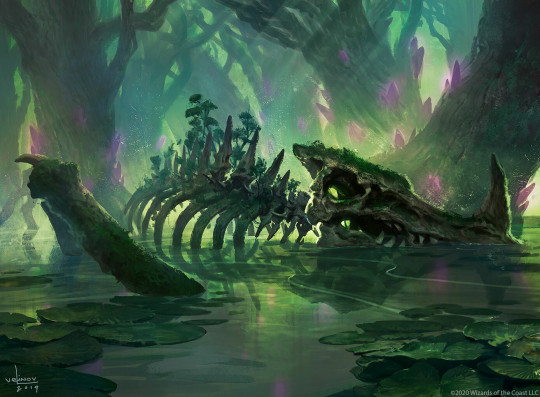
Black is one of the most misunderstood colors in Magic: the Gathering, not least because it appears on the surface to be so straightforward. Look at the most iconic black cards of Magic and you'll see deals with demons, necromancy, mass destruction and cruelty and suffering–the trappings of classic fantasy evil. Even the color's symbol itself is a skull, a universal signifier of death and danger.
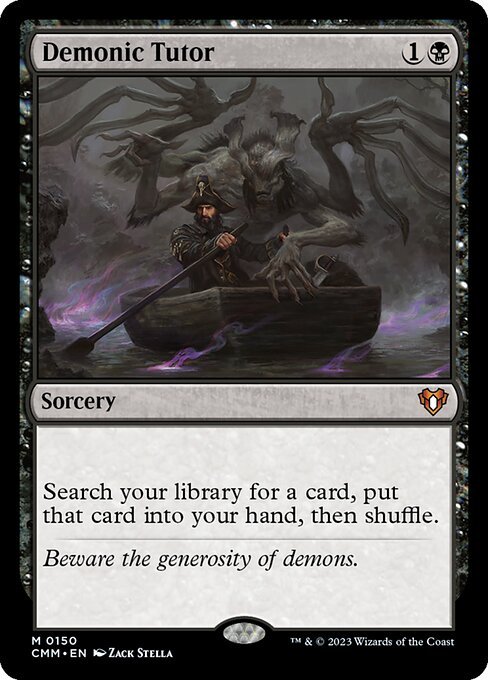
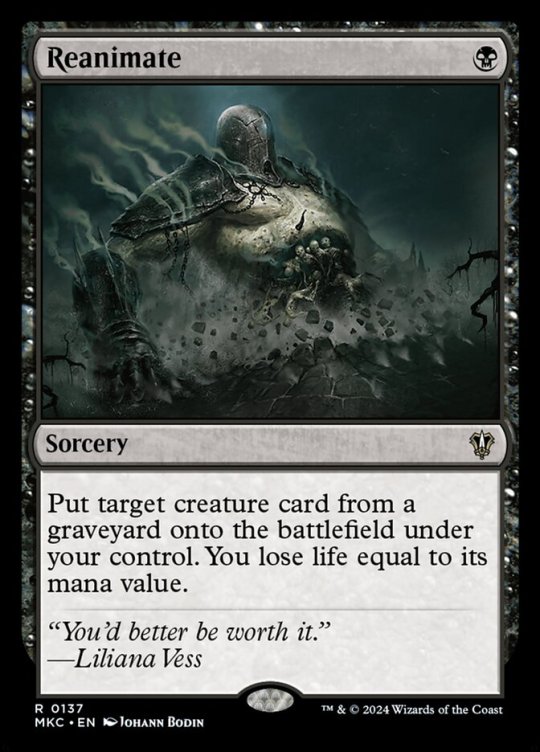
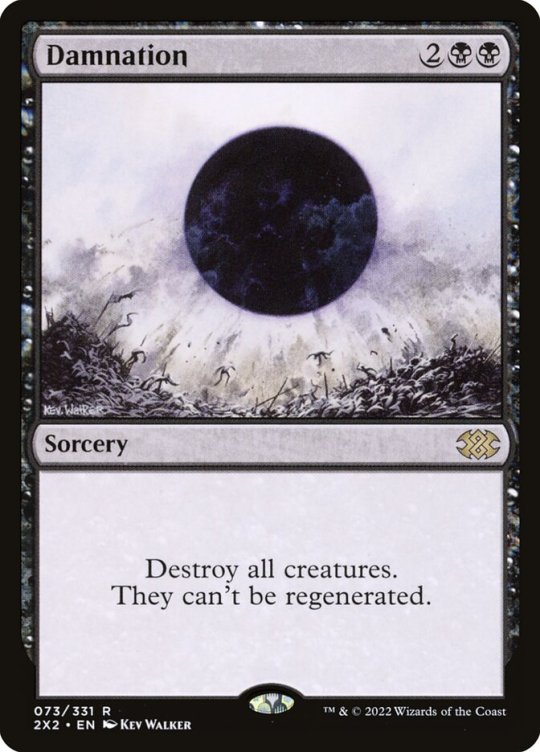
And in early Magic that seemed to be all it was. White was the color of Fantasy Good, black was the color of Fantasy Evil, and the rest of the colors were... fire magic? Elves? Whatever odd but intriguing skeleton affairs are implied by Time Walk?
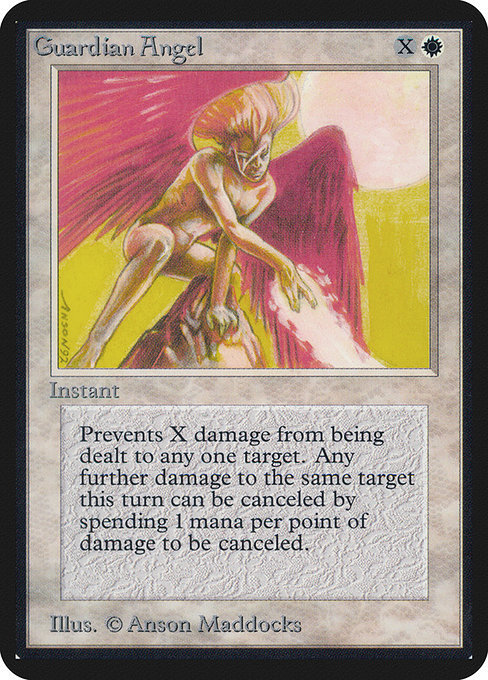
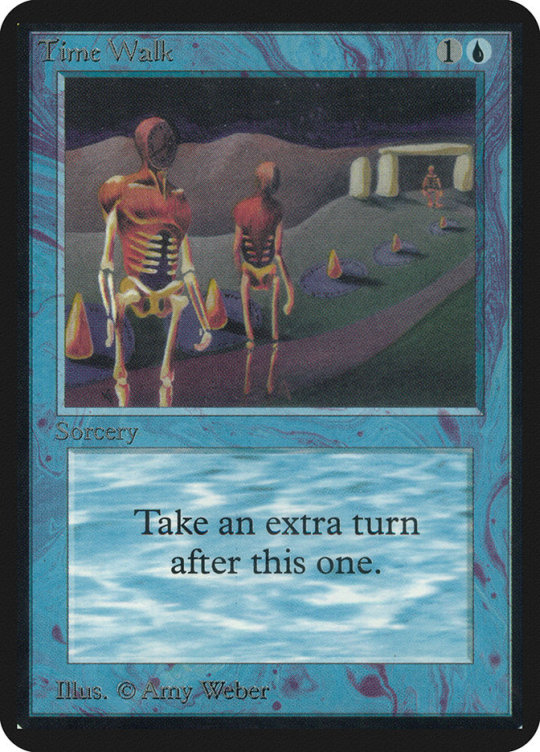
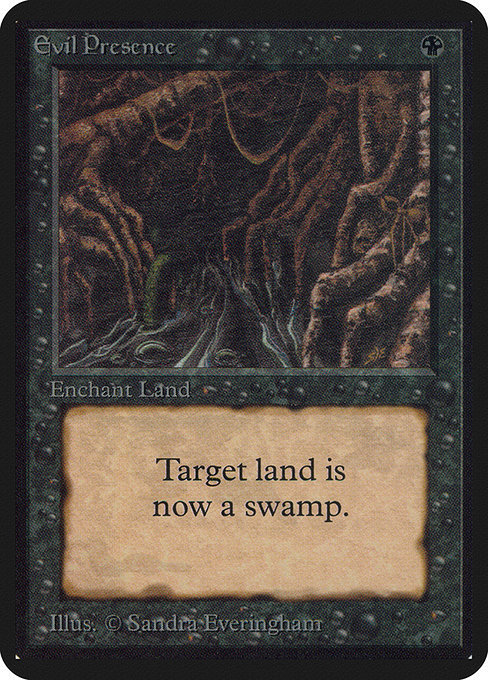
Gradually, though, Magic deepened as both a game and a storytelling medium. The color pie grew into itself as a system of complementary philosophies, archetypes whose associated aesthetics were only part of the full picture. Their arrangement around the wheel, below, is highly deliberate; neighboring colors are said to be allies with a high degree of philosophical and mechanical overlap, while colors on opposite sides of the pie are known as enemies, more likely to disagree on fundamental levels.
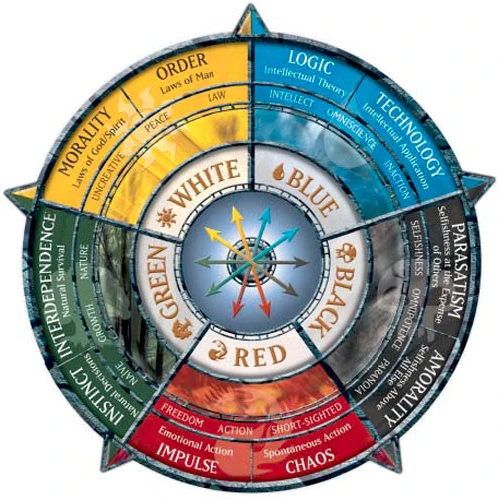
Black stopped merely representing capital E Evil and became the color of striving for power; unlike its peers, black felt that nothing, least of all morality, could prevent it from seizing what it wanted. Mark Rosewater's 2015 article about black emphasized the color's focus on the self:
"Black's philosophy is very simple: There's no one better suited to look after your own interests than you... Many costs require the sacrifice of others for your own advancement. Because it puts itself first, black is always willing to make this trade. The weak must fall for the strong to thrive." -Mark Rosewater
At its worst, black is an exploitative, amoral color that prioritizes itself at the expense of all others, allowing the "weak" to fall and scorning the very idea of compassion. Rosewater writes that black is "always willing" to trade others for itself. And these can certainly be parts of black's philosophy, when taken to its worst possible extremes, but they're far from the entire story.
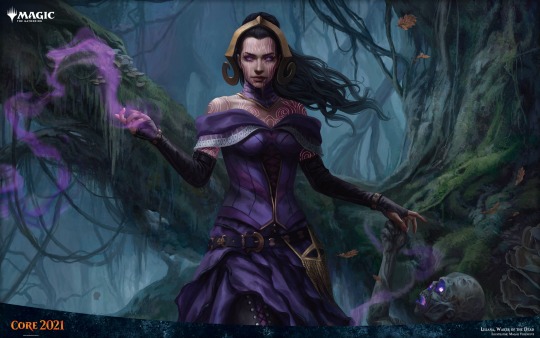
Over time, Magic's outlook on black gained nuance. Magic story introduced protagonists like the necromancer Liliana Vess, whose craving for immortality, seemingly exploitative nature, and demonic deals called back to the oldest portrayals of black–and yet she was not one-dimensionally evil. She underwent character development over the years, learning the value of reclaiming herself and standing beside others, and at no point did she become any less mono-black for it. Remember her; we will come back to Liliana and her story later.
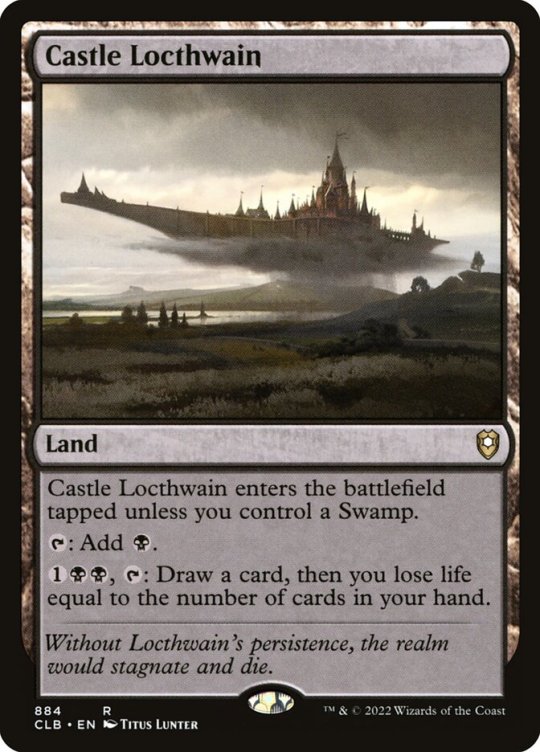
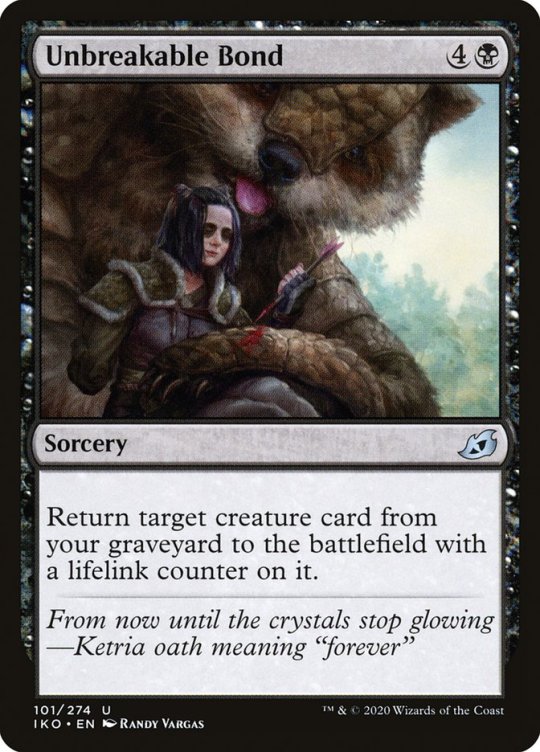
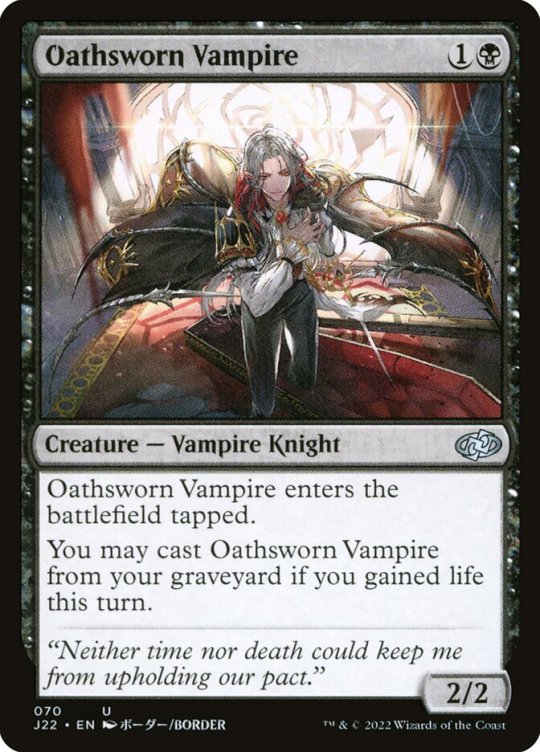
In addition to the usual death and decay, black cards began to feature a theme of relentless devotion. On the plane of Eldraine where each color represents a virtue, black's is persistence, explicitly as important as any other color. On the plane of Ikoria, the love between bonder and beast pulls Winota back from the brink of death. Wherever this Oathsworn Vampire printing is set, its flavor text is quintessentially black. It's the same self-driven attitude as before, but cast in a different light: black is nothing if not persistent when it's got its heart set on something (or someone) it cares about. Nothing, least of all the grave, will keep it down. After all, black will always come back for its own.
These newer cards uncovered the true face of black as a color capable of both great love and harm (sometimes even the latter for the sake of the former), and suggested a tantalizing new thread: perhaps putting yourself and yours first isn't all that bad, necessarily. Black is a deeply protective color; it says you don't just have to accept what you're handed, it's okay even to be furious about it (hello, ally color red), but let that galvanize you to do something about it.
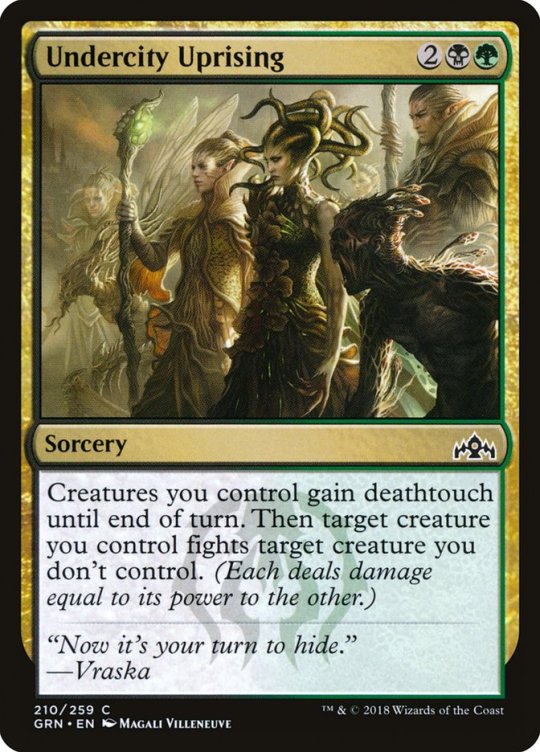
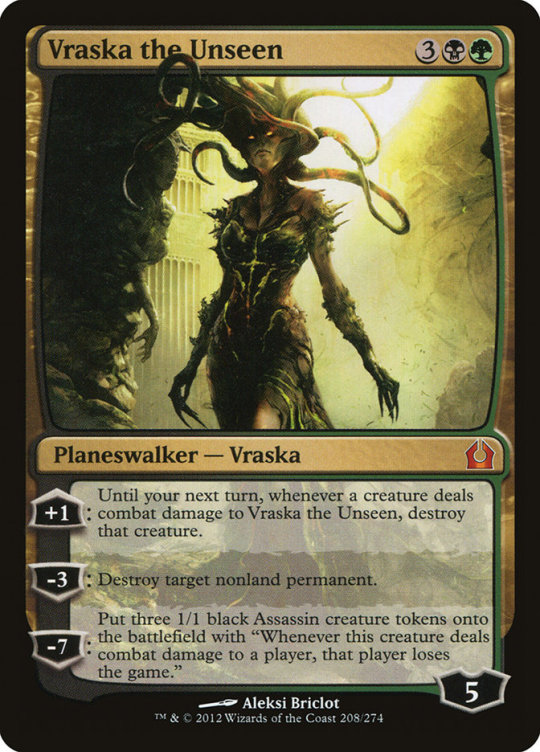
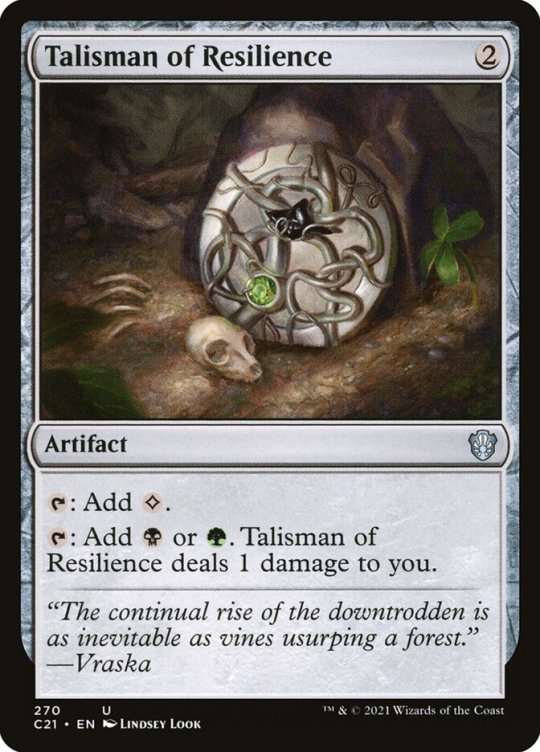
Vraska, a gorgon who faces extreme discrimination on her home plane of Ravnica, triumphs by reclaiming herself, gorgon powers and all–and even more radically, loving herself. She displays traits often considered the purview of white and green, such as a love of home and a drive to elevate the oppressed, but they are all filtered through the lens of her black alignment. Vraska staunchly refuses to deny herself or her people, the Golgari Swarm, of their value. Nor does she allow law or propriety to prevent her from championing them by any means necessary–even if that means cold-blooded murder, or aligning herself with a villain like the Planeswalker Nicol Bolas.
"[Vraska] thought of Mazirek, of the kraul, of the rest of the Ochran assassins and the malignant Jarad who reigned with casual ruin over the most downtrodden of the downtrodden. She remembered her years of isolation, and the heinous cruelty of the Azorius, and how no group deserved to suffer as much as those who would subjugate her own. Eliminating that hell was all she ever wanted." -The Talented Captain Vraska, Alison Luhrs
Like Vraska, black loves fierce and hard, willing to break any taboo for the sake of those it cares about. And it whispers, the entire way through, you are enough. You deserve better. No matter what others may say or do, you are enough.
"If I am to be met with disrespect, then I must first love myself with a fierceness no fool can take away." -Vraska in Pride of the Kraul, Alison Luhrs
Even black's "ruthlessness" isn't as fundamentally cruel as it appears, centering a passion for problem-solving (shared by its other ally blue) instead of a blunt disregard for others.
"People don’t understand the word ruthless. They think it means 'mean.' It’s not about being mean. It’s about seeing the bright, clear line that leads from A to B. The line that goes from motive to means. Beginning to end. It’s about seeing that bright, clear line and not caring about anything but the beautiful fact that you can see the solution. Not caring about anything else but the perfection of it." -K. A. Applegate
All of this comes together to make a black a color not of evil but of strength, integrity, and persistence. And that's all well and good, but I'm going to take it even further and put forward a new proposition: that black is the color of hope.
Of the nine mono-black Magic cards with "hope" in their names, all but Liliana portray black as an instrument of hope's destruction. This is, once again, black's flaw taken to its extreme–crushing others to achieve its own ends–but neglects black's own relationship with hope.

Black, more than any other color, requires hope to stay alive.
For black to persist, it must believe in a light at the end of the tunnel, a future in which its goals are realized. As long as it does, it will endure any hardship, walk through fire, and turn reality itself upside down on its way there. Primal, desperate ambition is the engine of hope that burns at the heart of black, keeping it always one step ahead of stagnation. Bitter and stubborn, black believes tomorrow will come because there is no other choice. After all, for black to relinquish hope is to let itself wither, regress, and die–an unacceptable outcome.
Thus, it is monumentally difficult to strip black of hope. That only makes it all the more crushing when it happens, when black contends with the idea that there is nothing it can do.
Black's deepest, darkest fear is helplessness.
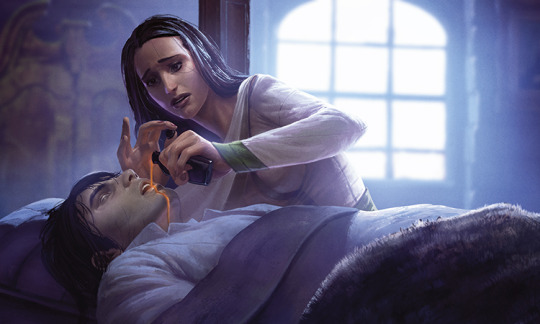
Like any mono-black character, Liliana Vess is driven at her core by a seething, desperate hope. When Liliana first unlocks her necromantic power, it is out of a sheer refusal to allow her ill brother Josu to die, even when the esis root that would cure him is destroyed by enemy witches in an undead-raising ritual. She defies her previous training as a healer, which taught her only to take the safe path, in favor of a higher-risk and higher-reward approach: stealing life from the witches themselves to restore power to the esis root she needs. It is her knowledge that her brother needs her, and her sheer stubborn will to succeed, which allows her to defeat the witches against steep odds.
"Six foes, and Liliana stood alone. But Josu's life depended on her, and the power blossoming within her was more than enough." -Liliana's Origin: The Fourth Pact, James Wyatt
Tragically, however, Liliana's attempted cure goes horrifically wrong, transforming Josu into an undead being plagued by eternal suffering. In his pain, Josu attacks Liliana. For a while Liliana holds out hope, finding the power to fight back while she determinedly searches for a spell to reverse the harm she's done. It is when she realizes this isn't possible that her strength falters.
"All this time, she had believed… that she could turn the power of death to the service of life and health. That a healer should use every tool at her disposal. But Josu was the result, a horrible fusion of life and death, and all her spells meant to manipulate the life force of the living could do nothing to harm the dead." -The Fourth Pact
Liliana learns that even her own dark magic, fueled by determination, cannot solve the problem she's created. She discovers the hard limit of her willpower, and the despair of this discovery is what causes her Planeswalker spark to ignite.
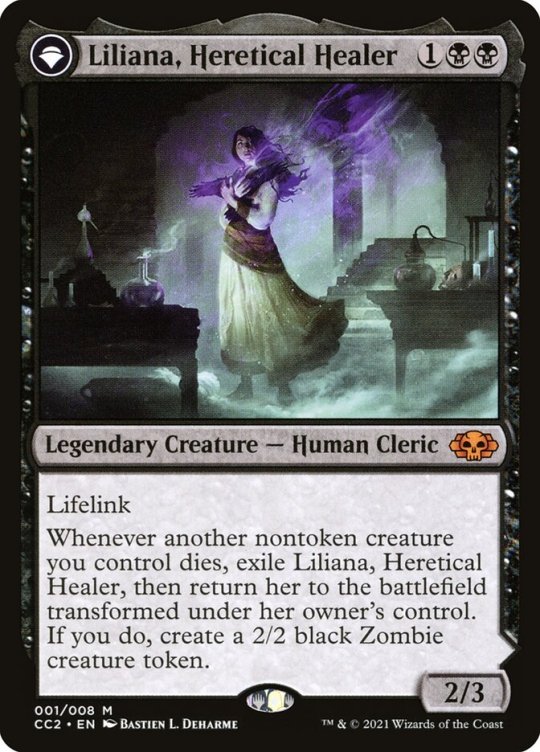
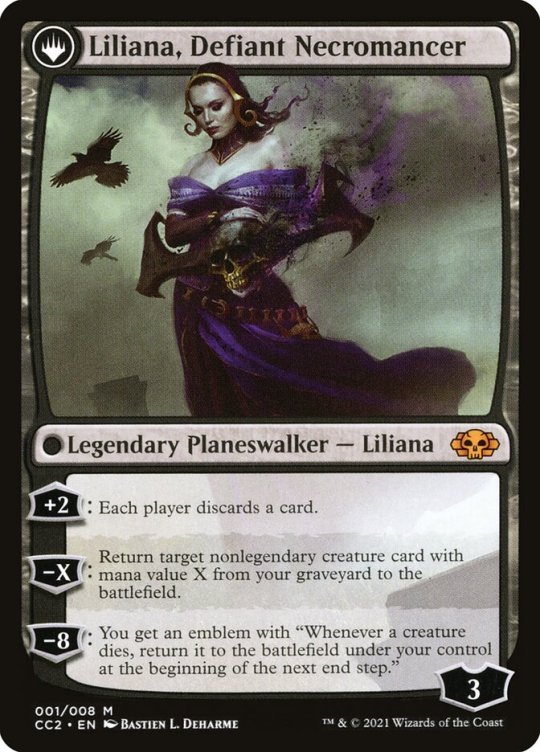
At this time Planeswalkers are as gods, immortal and near-omnipotent. Liliana spends decades enjoying this affirmation of her capability before the Mending strips her and all her peers of their power, reducing them once again to mortal mages.
"Then the Multiverse reshaped itself, robbing her—and every other Planeswalker—of the godlike power they once had wielded. Some called it the Mending, as if something broken had been repaired, but to Liliana, it seemed the opposite. It broke her beyond any hope of repair." -The Fourth Pact
Once again, it is Liliana's fear of helplessness and her refusal to accept it that drives her to push beyond the bounds of propriety–this time, to make a pact with Nicol Bolas and four demons to maintain her immortality. It is not enough for her merely to delay death; she requires the security of knowing she is fully beyond its reach, that she will never be helpless before it again as she was with Josu.
"Holding death at arm's length for whatever years are left to me? No, that's not enough. I want to be free of its shadow." -Liliana in The Fourth Pact
Black isn't like its enemy colors white and green, which are superficially associated far more often with hope. Unlike white, it doesn't believe that conviction, justice, and community will bring about rightness. Unlike green, it doesn't trust in the wisdom of the world or the natural order. Black believes that nothing will change unless you make it change; ultimately, black's self is the only one it can trust to bring about the world it needs. In addition, black lacks its enemies' idealism. Instead, it strives to be a pragmatic realist, making a final assessment of defeat all the more definite and crushing.
While white and green are more amenable to finding hope and holding it aloft as a banner, black claws hope desperately to its chest with shredded, bloody fingernails. Every ounce of hope black has, it tore by itself from the clutches of an uncaring world.
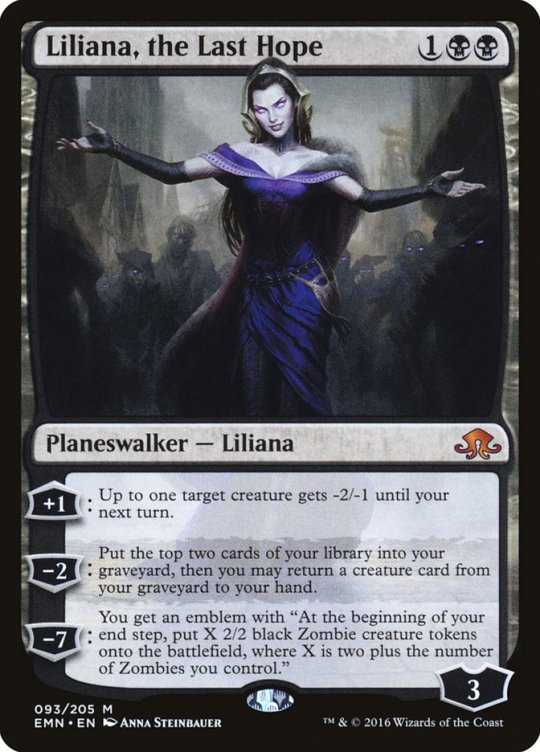
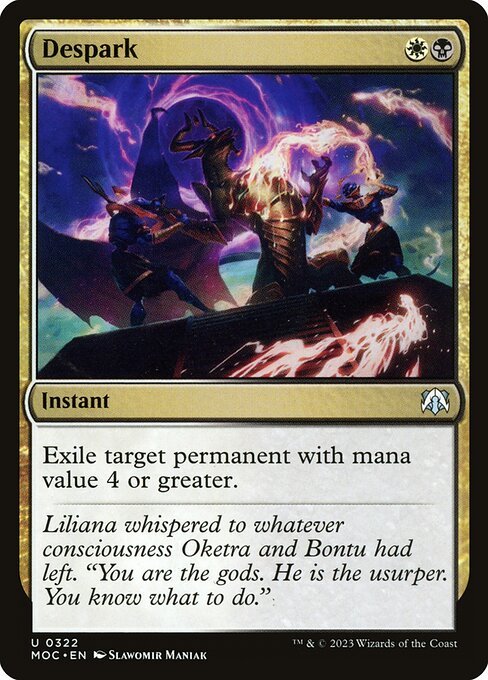
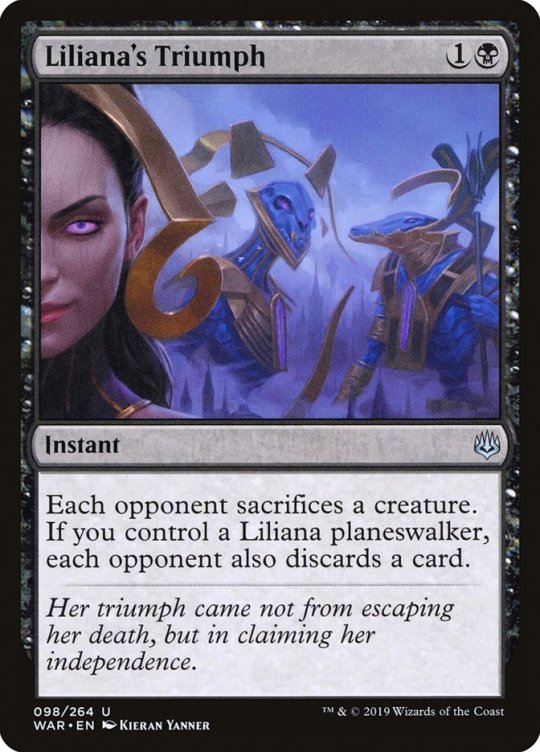
Ironically for such a self-driven color, black's fierce hope is the greatest asset it can provide to others–on its own terms, of course. It was Liliana who turned the tide of battle against the Eldrazi titan Emrakul, defiant in the face of cosmic despair. And when Nicol Bolas made his bid to return to godhood, using Liliana's necromancy to command his undead hordes, Liliana finally turned against him. In reclaiming her power, so too did she use it to free her fellow Planeswalkers from Bolas' assault. Her fear of helplessness no longer shackled her to him; agency and autonomy were hers at last.
The triumph of black, its moment of ultimate victory, is the hard-won fulfillment of its hope.
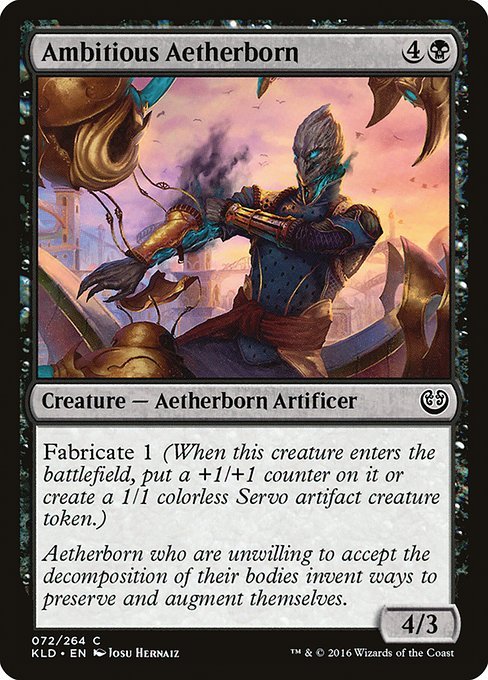
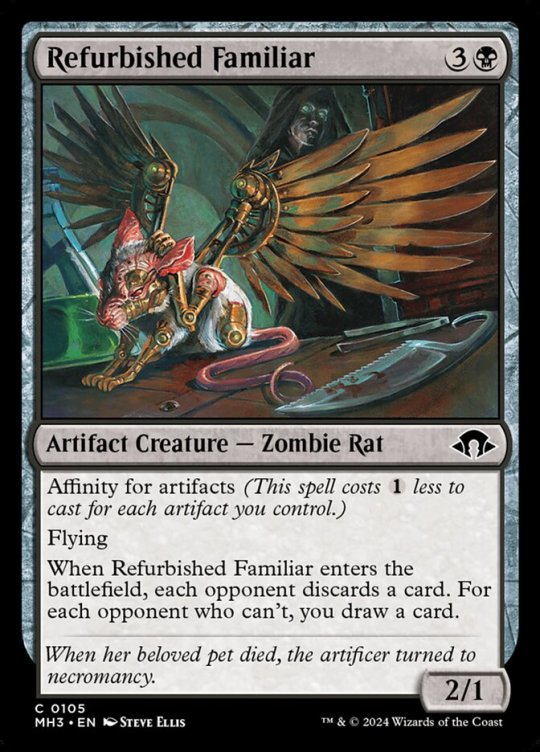
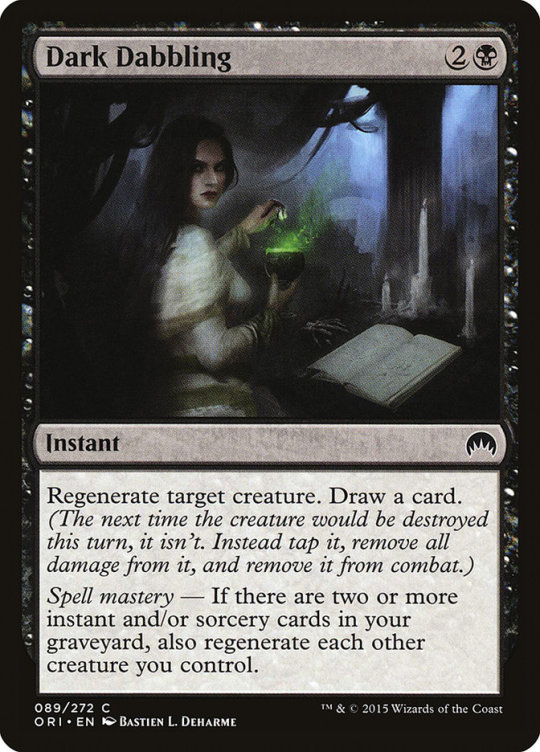
"Do not go gentle into that good night. Rage, rage against the dying of the light." -Dylan Thomas
An aetherborn, railing against the shortness of their natural lifespan, constructs a new body for themself with their own bare hands. An artificer's grief over her lost companion causes her to push invention to its limits. A young girl who loves her brother calls on the darkest of powers to save him. As it turns out, necromancy–that original thematic keystone of black–is only one of black's many, many refusals to let go of love and hope once it has them, even in the face of the ultimate end.
Time and time again, black–in love with life, ablaze with hope–looks the Grim Reaper in the eye and tells it: "Not today."
#mtg#magic the gathering#color pie#black mana#liliana vess#vorthos#literary analysis#war of the spark#magic origins#planeswalker#nicol bolas#vraska#necromancy
1K notes
·
View notes
Text
I love you messy artstyle i love you visible brush strokes I love you textures and rough edges I love you imperfections I love you roughness and colour blobs I love you scratchy sketches and bold stylisation and dirt and imperfections I love you ugly and raw emotion!!!!! ❤️
#i talk sometimes#art talk#i made a tweet like this on twatter ages ago but i've been feeling this a lot lately#also this is the start of me writing more on this blog and not only using it as art because who cares!! i don't!!#I wanna translate raw emotion into colors and shapes. I wanna know where to ignore all details and where to go ham you feel me?#i used to dream about developing a style like for MtG where it looked like a masterful oil painting that oozes realism and details#and i've realised the last two years or so that I would actually hate that for me. I know I wouldn't enjoy doing it. For myself.#it's that pipeline from wanting to be the perfect realistic wotc artist to accepting that I will never be that#instead i wanna learn how to stylise better and get a good brush economy going yknow. I wanna be bolder.#i doubt i'll ever be as incredible as all these MtG artists no matter what anyone says. but it's ok!! i don't have to be!!!#i just luv art man!!
3K notes
·
View notes
Text
The MTG color wheel is a really good idea, with lots of possibilities. I'm a little suprrised that, given WotC owns both Magic and D&D, they haven't done more with it in the latter.
I wish more people used Magic the Gathering's Color Pie instead of D&D's alignment all of the time.
Like, saying a character embodies the selfishness and impulsivenes of Red Black offers more depth than Chaotic Evil
14K notes
·
View notes
Note

In reference to my comment about your latest work perfectly evoking that 80's fantasy painting feel and it would fit right in on a magic card... I decided to have a little fun with the MTG website's "cardsmith" function. =3 I think it's fitting that an utter bastard(tm) like Hyden would have to be represented by an utter bastard of a card. (For those that do not play Magic: The Gathering, "Counterspell" is one of cards that's so good, it's remained remained unchanged/the bar for what it does for 30 years. Basically, you pay mana at instant speed (whenever you want, including other people's turns), and you can prevent someone from playing a card, as they are playing the card. And unlike the Counterspell card itself - that is 'spent' once you play it like a rocket - Hyden is a creature on the field that has that as an ability, and thus, can be used as much as you like provided you have the mana to spend.) So, Hyden just having The Counterspell on demand with no perquisites or drawbacks would be hilariously broken and unfun to play against - a card that equals his real abilities as a Wizard... before his 'injury' anyways. Oh, and he can take your favorite person/creature, and dissolve them into black goop that'll try to kill you. That is also very Hydencore.
I think Hyden would be proud to be on a card that's so good, it's either A) Banned from play/locked to an obscure format, or B) will make you public enemy #1 with every other player at the table.
Hahaha this is very fun! Thank you for whipping this up, and for the explanation on his abilities, too! I briefly dabbled in Magic as a teenager and don't remember all that much about the meta, but know enough to see how broken this guy is. I like that you made him a 1/1 too--as he should be, sitting on the back row being protected by burlier creatures while he slings his annoying cheap shot spells.
#excellent choice of color for him too!#ask#not an art post#well... kind of an art post#skekdris#mtg
61 notes
·
View notes
Text

New Phyrexia Miku
#mtg#magic the gathering#doodle#jin-gitaxias#miku#i've been calling him Miku btw because of the color of the RGB gamer lighting along his neck
101 notes
·
View notes
Text
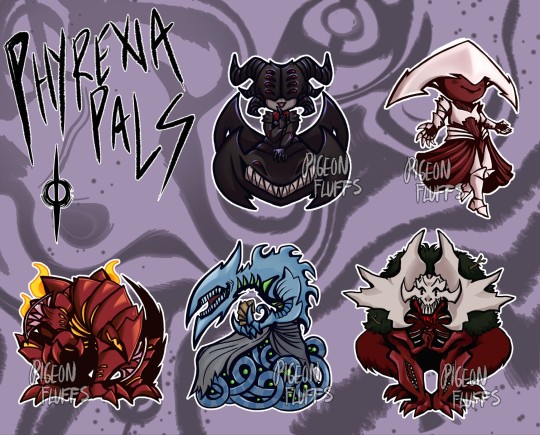
The gang's all here!!! Which Phyrexia Pal is your fave?
Planning on making these into a stickers (and maybe even a sticker sheet idk) to decorate my deck boxes with, so this is a lowkey interest check to see if anyone else would want these lil guys too!
#mtg#magic the gathering#phyrexia#sheoldred#vorinclex#jin gitaxis#elesh norn#urabrask#digital art#fan art#yes i AM calling these phyrexia pals because theyre all so friend shaped#theyre horrific monsters but that doesnt make them any less loveable#ill adjust the colors before i print any because theyre not QUITE print ready but i was very excited to show ppl and get feedback haha
74 notes
·
View notes
Text
Ok so. Playing Commander games of Magic the Gathering.
Sure, I'll agree that it's a bit of a bummer, dude, when one opponent decides you're the most deserving of a little consecutive spanking. This cheeky nerd has opted to put all their eggs (Doom Blades) in one basket (my face) and that's just how it be. Like most games, it's a play-fight. Sometimes they apologize and I just smile and wave it away. If I think I'll get a laugh out of 'em, I'll put my hands on my head and play the part. "Oh noooo! My caaaaaards!!"
ho-ho-ho tee-hee-hee. Bit of a ruckus over at that table, eh?
....
However.
WHEN YOU SCARE THE HOES SO THOROUGHLY THAT EV-ER-Y-ONE AT THE TABLE DECIDES YOU'RE THE PROBLEM.
I LIVE FOR THAT SHIT, MAN.
When my deck is popping the fuck off and my weak opponents [Pitiful] realize that they may only hope to defeat me [Awesome] by loudly declaring a truce and pointing each and every one of their little cardboard knives at me.
That's just so more fun than winning, honestly. I may die soon after, but then I get to sit on the sidelines, shuffling my cards, and enjoy the power fantasy of a Season 1 Anime-Villain-Turned-Ally.
"You've taught me a valuable lesson today about the power of friendship" I say, arms crossed and head nodding. "Perhaps next time I'll think twice before being so openly good at card games." I won't.
31 notes
·
View notes
Text
Why is a villain on a boros card? 😧😧😧😧😧😧😧😧😧😧😧😧😧😧😧😧😧😧😧😧😧😧😧😧😧😧😧😧😧😧😧😧😧😧😧😧😧😧😧😧😧😧😧😧😧😧😧😧😧😧😧😧😧😧😧😧

31 notes
·
View notes
Text
Trying to figure out how I would flesh out wedge identities, so decided to take a page from MaRo's book and have them talk to one another. First up.
White, black, and red - Order through structure, action, and opportunity. White: Order through structure means having strict rule- Red: Ha! Rules schmules White: Why must you be like this Black: Because they are. Simple as that. White: Ugh… here we go again Red: So tell me, who exactly defined what order is? Order doesn’t mean peaceful. Hell, I’d call most order not peaceful White: Order is the way the world should be organized, so that the most people gain the best access to what they have and need, its a system where everyone is allowed to live Black: No, it isn’t. White: What? What do you mean? Black: Order is how things are organized in a logical manner, yes, but they are not inherently ordered around “goodness” Red: See! Black gets it! White: Ok ok, so what do you two propose order as? Black: Easy. Order is how the world is organized. Order should be based on power. White: Power? Black: Yes. Power. The people at the top have the power, they make the rules and everyone else plays by them Red: Eh, I can see where you’re coming from black, but I don't fully agree with that. Order is how the world is organized. Order should be based around freedom White: Freedom? How? Red: Order should be based on saying “here is everything we don’t allow. If it's not written here, it's a free game.” It should show the hand everyone starts with, metaphorically speaking, and clarify what is not an option. It shouldn’t just rule out personal thoughts and motives. It's the difference between telling someone they can’t do something while they’re in the middle of it versus telling someone up front they can’t do that and allowing them to think of other options for themselves. You want the world to be even? Give everyone the same playing field. White: I can’t believe I’m actually saying this…. But that actually makes some kind of sense. Red: See! I’m not against structure, I'm against pointless structure. Whatever rules are made should be as simple and all encompassing as possible. No complicated legalese telling specifics, it should be all about giving people the information they need. Black: Ok, I want to chime in here. I can see you two agreeing on this but I want to remind you I’m also here. I think order should be used to put the powerful, me, at the top. How does that fit into your little utopia plan? White: Uh….what… what if… oh Serra I’m actually saying this and kind of meaning it. What if we base the order around power, so that the person in charge declares the base rules and others can interpret them. What if… what if we all stay together at the top and set out guidelines that others can live with. Black: How does that give us power though? Red: Oh! I get it! It gives us power because we have the ability to change the rules once we’re on top. We can stop others from taking our place by blocking the path we used to get there with new rules! Black: Hmm… interesting. I can’t believe it's actually happening… but I think we may have an agreement here. White: Holy shit that’s a first. Red: Wait we can cuss!? YOU CAN CUSS!? White: Yeah, no shit. Black: You’re both fucking idiots. Red: I hate you both, but I think that’s an agreement. Truce? White and Black: - Truce.
#i'm writing more#mtg#magic the gathering#idk#mtg colors#color philosophy#colors#mardu#dega#boros#rakdos#orzhov#identity#mtgcolor#mtgaddicts#discussion#white#black#red#white black and red#savai#color talks#colortalks#colors talk#color discussion#philosophy#magic the card game
14 notes
·
View notes
Text

Mischievous Elf
#ai#aiart#ai art#mischievous#mischief#elf#elves#machine elves#trickster#acid trip#trippy#psychedelic art#surreal#neon#neon colors#neon core#fantasy#fantasy art#rpg art#dnd art#mtg art#hat#lisa frank vibes#bodypaint#body art
23 notes
·
View notes
Text






I saw some art in a kind of trading card style and I couldn't help but mock up some rough dungeon meshi mtg cards! I know the party mechanic would fit pretty well here but I was already halfway done by the time I realized lol and also I don't play with that mechanic so idrk how it works!!!
#I should do izutsumi and kabru next#izutsumi I figure will have boring ninja stuff#Kabru I think I'm gonna make do voting that sounds like a funny way to mechanically represent gossip#dungeon meshi#mtg#magic the gathering#Please let me know if you think any of these cards are unbalanced!#dungeon meshi spoilers#dunmesh spoilers#delicious in dungeon#dunmeshi#magic: the gathering#mtg commander#also the maker I was using couldn't do multiple color identities so its a little rough but w/e!
83 notes
·
View notes
Text
he's got that Sultai Smolder
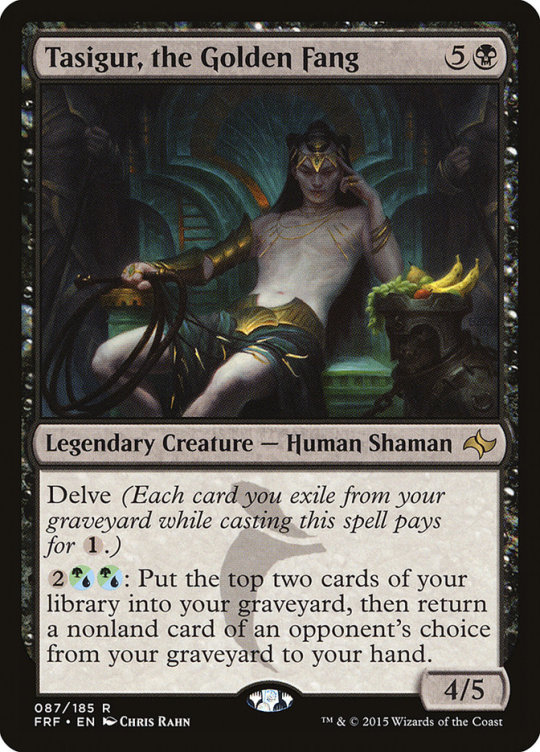
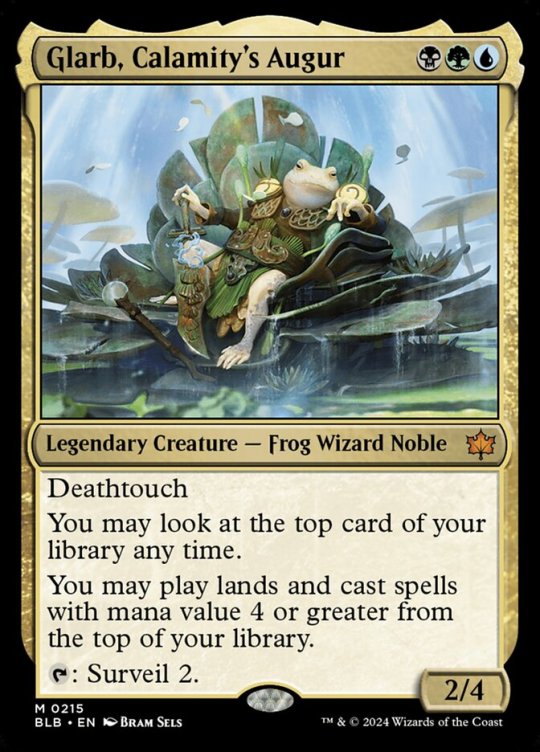
#the side by side is actually killing me it's so .#you have to be THIS cunty to get on this ride (BGU color identity)#mtg#magic the gathering#tasigur#glarb#bloomburrow#tarkir
152 notes
·
View notes
Text
Doing The Right Thing: An Analysis of White's Monologue. (MTG)
This will be an extensive analysis of "My Words: White", in which game designer Mark Rosewater talks at length in the words of Mtg's mana color, White. This roleplay approach to explaining the color pie's differing philosophy and why they have a predisposition to certain tactics is my favorite, and I've been eagerly awaiting a return to pie philosophy since the last article was written years ago.

>"To explain my philosophy, I would like to begin by taking a step back and looking at the world as a whole. There are a lot of problems. There is crime, injustice, hunger, disease … just an endless amount of suffering."
White, consistent with its past interpretations, pitches itself as a solution to the world's problems. Not necessarily a problem, plenty of philosophies do that. Especially memetics which want to spread. No one likes crime, injustice, hunger or disease; so this acts as an effective hook. >"But here is the important thing—there does not have to be. I will use hunger as my example. There is enough food for everyone. Starvation happens not because we do not have the means to feed people but because people prioritize things over the welfare of others."
White likes to emphasize that evil isn't something inherent to the world, it's something that's infected it. A contagion that humans have brought with them and that humans can get rid of. This certainly is more compelling than the "There's nothing you can do about bad stuff existing." That White's enemy Black is known for. But take note that White's thesis statement here is that humans are the cause of other human's suffering. >"Most suffering happens because we choose not to stop it. But we can. The potential for a utopia is real. We have the means to get there."
I don't know if its manipulative or just compelling, but putting blame and guilt on the reader for specifically *choosing* not to stop evil is very interesting rhetoric. To take White in good faith, this is more a textbook call for action than some armchair psychologist "manipulation". But this is once again putting human suffering on human's choices. Associating suffering with human activity is consistent with White's ally Green, and citing potential for utopia, and the possibility of a world beyond our dreams is consistent with Blue; White's other ally. >"It only requires us to make one change. I will acknowledge it is a big change, but it is a doable one. We simply need to learn how to put the needs of the group ahead of our own personal needs. Instead of asking, "What do I want?" we must learn to ask, "What does the group need?" If each person thinks about the needs of the group and acts accordingly, we can create a utopia where everyone has their basic needs met."
Another piece of rhetoric White uses (and has used in the past) is presenting its philosophy and changes as simple and actionable. For a sales pitch for anything to work, what the reader has to do cannot be presented as overly ambitious, even if its a big change. It can't scare them away. Claiming that it's philosophy is only "what does the group need?" also implicitly says that everything after this is for the needs of the group. Not that I'm trying to paint White as not having the group's best interest in mind; Its a philosophical concept, I don't see it as needing to lie to the viewer besides about its enemies. But I do want to point out the argumentative tactics that White has been using in order to make its philosophy as appealing as possible. >"So, why is everyone not doing this?" "The temptation to do things that will benefit you is strong. That is the conflict we are up against. But there is good news. People inherently want to help one another. There is a natural goodness within each of us that seeks to help others. I admit it is more apparent in some individuals than others, but it is there in all of us, and you can witness it if you look around your community."
Note the use of "we", everything White says is to make the reader see them and it as working together against a shared enemy. White makes a Green (and scientifically proven) statement of humans inherently wanting to help each other, a sentiment that their shared enemy, Black, despises. >"But how do we get from where we are to where we need to be? First, people need guidance. People will do the right thing if you nudge them in the right direction. How do we do that? The answer is simple: structure. Humans are creatures of habit. If you can provide the incentives to act correctly, they will, and they will continue to repeat those behaviors. That is the key; we have to create a society where helping one another is core to how it is built." Another scientifically proven point that White uses for it's pitch: good behaviors will naturally emerge out of a system which rewards them. This is the reason behind White's obsession with structure. While White believes people naturally want to be good, it doesn't believe them to know precisely how. >"If one does the wrong thing, they get punished. Maybe you lose some of your resources, like money. If it is serious enough, you can lose your freedom and be locked away."
When speaking about it's enemies domains (money and resource hoarding is associated with Black, and freedom associated with Red) White isn't being outwardly hostile yet. White believes in the merits of money and freedom, but also doesn't see either as sacred. But rather, these are acceptable loses should one jeopardize a utopia. I believe this to be an important point to the understanding of the pie in 2025+. The Colors are (or atleast we know White to be) not actively spiteful of what their enemies want, they just see too big an obsession on those things as threats to something obviously more important. >"The most useful tool to tackle selfishness is morality. You have to teach people that there is an objective right and an objective wrong. If you do right, you are good. If you do wrong, you are evil. There are rewards for being good and punishments for being evil." "good people get to become part of the community, and evil people are shunned from it."
Here's the Black vs White axis, Morality. Interesting to me is that White does not see it's own motivation for good as enough for people, and that there have to be incentives outside of it. The mere absence of a utopia isn't enough. For as much as the White stereotype is obsessed with the right and wrong thing, actual White is fine if people focus on rewards and punishments instead of right and wrong for their own sake.
White phrases community involvement as a privilege, intentionally or not. If you're good, then you get to be in our society. Even though White says people are inherently good, White respects and fears the ease that people discard that goodness. This is a key part of how White sees Black; alluring. Even in old interviews, White refers to evil as "knowing how to tempt people" and earlier in this letter, it mentions the temptation of evil. This possibly gives context to the boarderline manipulative rhetoric nearing the start of the article. White knows that on the face of it, Black is flat out more tempting. Insert a joke here about how no one wants a white guy telling them what to do. >"A lot is on the line. One path leads to peace, the other suffering. Each rule that is broken means someone is hurt. If we have to take a heavy hand to ensure peace, to ensure that people can live a life without suffering, it is what has to be done. We are fighting a lot of powerful forces, so our messages have to be loud and clear." Speaking of unappealing aspects of White, it's "greater good" mentality is possibly the easiest way to make a White aligned villain; and the philosophical reason it has access to the vast, vast majority of the games boardwipes. So much so that the colloquial name for a boardwipe, a "Wrath" is a shortening of a White card: Wrath of God. If White believes that doing an evil thing will cause a greater net good outcome, it sees that evil thing as now being good. White's moralizing has no qualms with pulling the lever on the trolley problem; a solution many philosophers have come to already, and a testament to strong moral principles. But even these strong moral principles are certainly able to turn villainous given large enough scope and a song played in minor key. Interestingly, this "at any cost" mentality towards its goals is shared with Black (if to radically different ends), making Orzhov the color combo most willing to make sacrifices.

>"The most useful tool to tackle recklessness is the law. The law presents a list of things you are not allowed to do because they endanger society. If you commit one of these acts, there is a punishment of proper weight. The greater the threat to society, the larger the punishment. It is important that these rules are public and clear. They delineate from what you can do and cannot do. Like morality, there should not be any gray areas in these rules. Also, as with morality, you need to teach the public that breaking these rules leads to consequences. But what about people accidentally getting caught up in the system? What if someone does something wrong but for an important reason? Perhaps someone kills another, but only in self-defense. This is where you get the judicial system. People can judge the circumstances to make sure that people are not punished incorrectly."
A very interesting piece about White's world view (and one of the only places I vehemently disagree with it on) is a hatred of so called "gray areas" in morality and law. White is frequently painted as deontological, and this fully leans into the stereotype. You are either evil or you are good, you either did an evil thing or you did a good thing. And any nuance in actions or circumstances only serves to influence the final verdict. This isn't to say that White believes something like murder is always evil, just that with proper circumstances such a thing instead becomes good. A hate of gray often gets seen as a blindness to complexity of circumstances, but White instead seems to mean that the end result is a binary of either good or evil.
>"there might be others outside your group that have ill will toward your society. That is why you also need a military, to provide someone who can protect against those who wish your society ill."
White has gone from "Mine" to "Ours" to "Your", fully trying to get the reader to identify with it's ideology without thinking about it. Again, this isn't like some evil scheme, just a notable rhetorical device. This also reinforces White's idea that there are enemies who are wishing you, and more importantly; your utopia, harm. >"The combination of morality and law is important because it gives depth to your message. You should not kill for two reasons. First, it is morally wrong. Second, it is against the law. This means there are all sorts of repercussions—these disincentives can be physical (you will go to jail), emotional (people will shun you), or spiritual (you will be punished in your afterlife). Different people will prioritize different incentives, so the breadth of responses will help motivate a wide variety of people."
White sees its two different axis (law for Red and morality for Black) as incentives for its worldview for two different kids of people. Crucially, morality has more appeal to the Red and Green side of the pie (emotional and spiritual respectively) while Law has appeal to Black and Blue (self interested and systematized) >"Now, Blue cares a lot more about the civic side of things (government, law, the courts) than the moral side. Blue is a little more focused on constant improvement over the impact such decisions have on the people. For example, Blue is much more willing to allow people to fall through the cracks if the overall system is improved. Blue is trying to raise the ceiling (creating the highest potential), while I am more focused on raising the floor (ensuring an absolute level of care for all). But we have a lot of shared goals."
A common critique of White, being the color of society, is that people can fall through the cracks of a society. This argument, while fallacious, is addressed; and White levies such a flaw unto Blue more than itself. This paragraph also supports my assessment that White's two incentives appeal to apposite pie ends, and I predict this will be a trend with pie traits going forward. >"My biggest issue with Blue is that Blue spends far too much time caring about the individual. Just as Blue wants to optimize society, it wants to optimize each member of that society. To do so, it will distribute things in ways that I think of as unfair."
The color pie addage "to find what a color argues about with its allies, look at the ally's ally" applies here. Whites issue with Blue is its issue with Black, just to a lesser extent; too heavy a focus on individuality and unfair distribution of resources. >"Where Green and I most differ is the role of restraint. I believe that to have an orderly society, there have to be rules in place that keep people from acting on impulse. Green, in contrast, functions more on instinct. That is not emotional per se but is instead a way of acting on internal motivations that are not inherently driven by the welfare of the group. In other words, Green has a wild side that scares me a little."
White being scared of Green aside, this highlights a common confusion in the pie. The difference between instinct and emotion. White here says instincts are just internal motivations, and those internal motivations won't always lead the group towards a peaceful place. >"People, left to their own impulses, will do dangerous things. Some people will get hurt and others will die. For what? So that Red can just do whatever it wants to do? The insidious part is that Red makes it so enticing. Yes, there are limitations built into a system for the protection of its people. I get how that can feel restricting at times, but Red uses that frustration as a justification to not have any responsibility for its actions. "Oops, you died," Red says, "but look at the giant fireball I made.""
"Black treats immorality like a trophy, something to be proud of. Recklessness is dangerous, but at least that is not on purpose. Black thinks of violence, disease, and cruelty as tools, things it can use to get what it wants. Nothing is taboo to Black. It will do whatever it needs to do to get what it wants, no matter who gets hurt in the process. In fact, Black seems to revel in causing others pain. Their end goal is a dystopia, a world where most suffer so a few can thrive. It is the exact opposite of what we are working toward. What makes this so dangerous is that each person has desires to prioritize themself. I have to create elaborate systems to educate people, while Black feeds their worst impulses. And Black can start small. It is so easy to get someone to make a tiny selfish gesture."
This, keeps the pattern of White being strangely understanding of how compelling its ally's are. White is aware laws can feel restricting and how easy it is to be just a little selfish, but sees these things as slippery slopes toward justifying worse and worse behavior. This is a common argument for deontology, a small bad thing being capable of leading to worse and worse bad things. This also frequently takes the form of the slippery slope fallacy. While some slippery slope arguments are valid, the specific worry about what's to come rather than what's being suggested is what makes it fallacious; not actually addressing the point at hand. Of course White shows a misunderstanding of its enemies and what they want, a trend I hope to see going forward. Black does not want a dystopia, it simply sees that as how the world works on a fundamental level. And Red sees itself as taking responsibility, accepting the risks of an exciting life as they come; I believe what Whites actually mad at Red about is not taking responsibility for other people's safety, something White does in spades. >"Black has come to respect the power of systems. Black saw how I was using religion and law and has created its own forms of it. However, they can still be effective in educating and motivating people."
The language "has come to respect" is intriguing, as it implies this was not always the case. The pie is not static afterall, and this seems to be an acknowledgement of such. Colors priorities wax and wane. I do wonder what Black's interpretations of religion and law are. Cults and crime families are typically colored Orzhov. (Organized (W) Crime (B)), so I'm unclear what forms Whites referring to here, assuming cults and mafia are a joint effort on part of the competing colors.
>"it is admirable that Red can care so deeply about the needs of another."
Big fan of the colors finding things in one another to like.
>"Which brings me to my strengths and weaknesses. Mister Rosewater likes to say those are each an extension of the other. I have embraced order as a powerful tool. It helps me shape environments and gives me access to more answers to different threats than any other color of Magic. Given the time to plot and plan, I can solve most any problem. The downside of that is each of my answers is prescriptive. That is to say it is tailored to a certain problem, so if a different threat shows up, one I was not prepared for, I do not have the flexibility to adapt quickly. I can often get caught off guard if I did not properly anticipate what was coming. Another one of my strengths is my morality. I know right from wrong and can act accordingly. When I lay my head down at night, I can do so without regret, knowing that I held myself to the highest standards. Part of that is that there are things I refuse to do. For example, I will not kill unless it is absolutely necessary. I choose instead to imprison my foes, but that means there are times when they escape and undo my work. That does not happen to other colors of Magic, like Black, who makes sure to permanently remove any threat, but I understand living correctly comes at a cost. I cannot win the day if I do not do it honorably. Each time you justify doing something you know you should not, you are taking a step away from utopia instead of toward it."
White acknowledges its rigidity, claiming that its either due to morality or a prescriptive plan; not ignorance of other options, as its enemies typically paint it as. And another instance of White treating even minor transgressions as slippery slopes away from utopia. >"I get that what I am asking for is difficult. Doing the right thing is way harder than doing the easy thing, but what I have to offer is important. We, as a society, have the chance to think bigger, to be better. We do not have to accept that the world is as it is. We can dream of a world free of suffering. We have the power to improve our lives if we just have the courage and conviction to do so."
I just really like this ending thesis statement. White certainly has shown manipulative tendencies, and a neuroticism when it comes to even minor moral mistakes. But its an earnest philosophy which gives the reader the power to shape the world into a better one. Its a philosophy that, while certainly righteous, is right in many different ways. Humans are naturally good creatures, we have opportunities every day to do the right thing and make the world a better place, and if everyone in the world started just taking the small steps...maybe we could form a utopia.
White is my fav color of magic, in no short part because of its philosophy being very close to mine. Its habit of board nukes and variety of threat answers get explained in this article, aswell as what its willing to partner with its enemies on. Can't wait for the next article.
15 notes
·
View notes